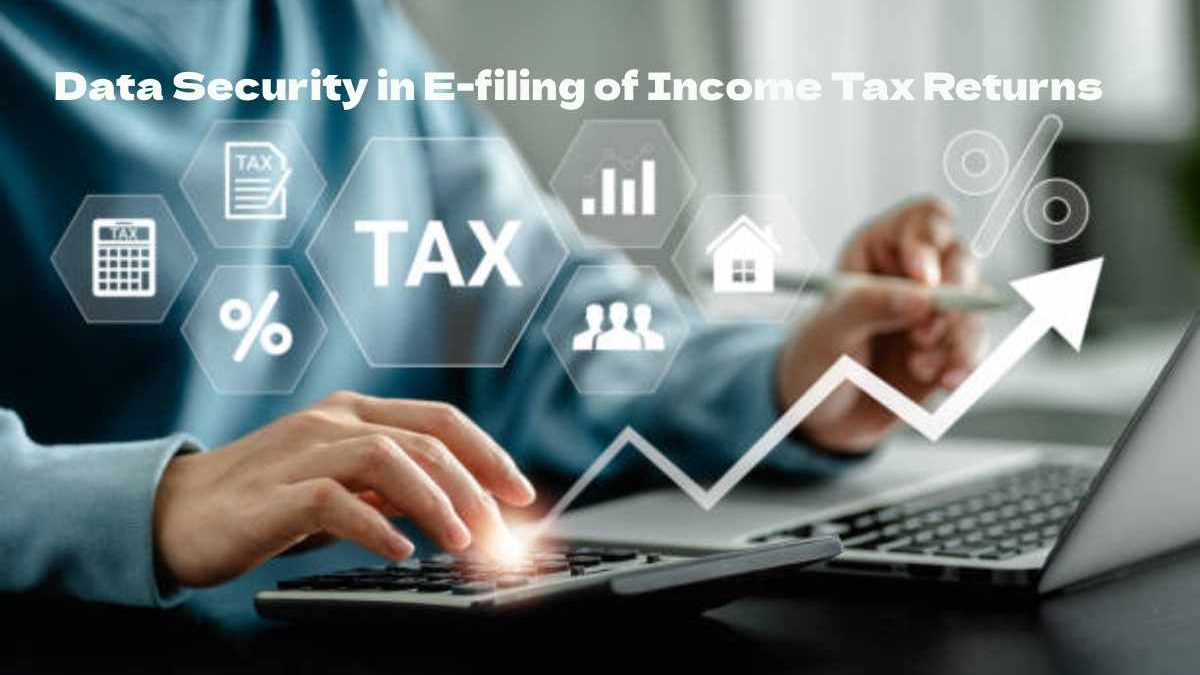Ensuring Data Security in E-filing of Income Tax Returns in India
Table of Contents
Introduction
E-filing of income tax return in India has become the norm in the digital age, offering taxpayers convenience, efficiency, and accessibility. However, taxpayer data security has become a top priority due to the growing use of digital platforms. The Income Tax Department protects sensitive data and e-filing platforms. This article discusses the importance of data security in e-filing and the Income Tax Department’s efforts to protect taxpayer data in India. The Income Tax Department’s security framework includes encryption standards, multi-factor authentication, secure data transmission, and storage. By understanding and following these measures, taxpayers can feel confident in securing their personal and financial information during e-filing.
Data Privacy Regulations and Compliance
Personal Data Protection: The Income Tax Department protects taxpayers’ data. Sensitive data is restricted to authorized personnel to prevent misuse or unauthorized disclosure.
Consent and Transparency: Taxpayers are informed about personal data collection, processing, and storage. The Income Tax Department requires taxpayer consent before using their data for non-tax purposes.
Data Retention and Deletion: The Income Tax Department follows strict data retention and deletion policies to dispose of taxpayer data after use securely. This reduces data breaches and unauthorized access to outdated data.
Public Awareness and Education
Communication and Awareness Campaigns: The Income Tax Department promotes e-filing data security through public awareness campaigns. These campaigns teach taxpayers how to avoid phishing, create strong passwords, and safeguard personal data.
Educational Resources: The Income Tax Department provides guides, videos, and FAQs to help taxpayers understand e-filing data security. These tools help taxpayers protect their personal and financial data.
Collaboration with Stakeholders: The Income Tax Department raises e-filing data security awareness with tax professionals, industry experts, and cybersecurity agencies. Together, these stakeholders promote data security best practices and secure taxpayer e-filing.
Robust Encryption Standards
E-filing platforms use strong encryption to protect taxpayer data. Data is encrypted during transmission and storage with strong algorithms to keep it secure and unreadable. During e-filing, this encryption protects taxpayer data.
Multi-Factor Authentication
MFA secures taxpayer accounts. One-Time Passwords (OTPs) sent to registered mobile numbers or email addresses are used to verify taxpayer identity during login or certain transactions while income tax return filing. MFA protects taxpayer data from unauthorized access.
Secure Data Transmission
During the e-filing process, the secure transmission of taxpayer data is paramount. The Income Tax Department ensures using secure protocols, such as Secure Sockets Layer (SSL) or Transport Layer Security (TLS), to establish encrypted connections between taxpayers’ devices and the e-filing platforms. This protects the data from interception or unauthorized access during transmission.
Secure Storage of Data
The Income Tax Department secures taxpayer data with strict protocols. Access controls, surveillance, and fire suppression protect taxpayer data centers and servers. Security audits and vulnerability assessments identify and mitigate security risks.
Access Controls and User Privileges
To prevent unauthorized access to taxpayer data, access controls, and user privileges are strictly enforced. Only authorized personnel within the Income Tax Department have access to sensitive data, and their access is granted based on the principle of least privilege. This means that individuals are granted access only to the information necessary for their specific roles and responsibilities.
Regular Monitoring and Intrusion Detection
Advanced monitoring systems detect and respond to the Income Tax Department’s suspicious activity and security breaches. Firewalls, intrusion detection systems, and log analysis tools detect unauthorized access, anomalies, and patterns. Proactive monitoring detects and mitigates security incidents quickly.
Security Awareness and Training
Recognizing the importance of security awareness among its personnel, the Income Tax Department conducts regular training and awareness programs. Employees are educated about the importance of data security, best practices for handling sensitive information, and their roles and responsibilities in maintaining the security of taxpayer data. These training programs help create a culture of security consciousness within the organization.
Collaboration with Cybersecurity Agencies
The Income Tax Department works with cybersecurity agencies and experts to stay ahead of evolving threats. Sharing and collaborating identify threats and implement proactive security measures to protect taxpayer data. This partnership protects e-filing platforms from attacks during the e-filing of income tax return.
Regular Audits and Compliance
The Income Tax Department conducts regular audits and compliance checks to assess the effectiveness of security measures and ensure adherence to data protection regulations. Internal audits, external assessments, and compliance checks help identify any gaps or vulnerabilities in the security framework, enabling prompt remediation and continual improvement.
Conclusion
Indian Income Tax Department prioritizes taxpayer data security. The Income Tax Department protects e-filed income tax returns with strong encryption, multi-factor authentication, secure data transmission and storage, access controls, regular monitoring, security awareness programs, and collaboration with cybersecurity agencies. These measures safeguard sensitive taxpayer data.
Data security requires taxpayer participation. They should use strong passwords, update software and antivirus programs, and avoid phishing and suspicious emails. These practices and vigilance can help taxpayers secure their data during e-filing.
The Income Tax Department strives to improve data security as technology advances and cyber threats evolve. Audits, compliance checks, and cybersecurity experts identify emerging threats and implement proactive security measures.
E-filing of income tax return boosts taxpayer confidence and adoption due to its convenience and security. Thanks to the robust security framework, taxpayers can rest assured that their personal and financial information is secure during e-filing.

